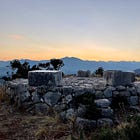This is the first piece in what will be a four-part series, featuring my reflections on the importance of prayer, the Passion of Christ, His death, and resurrection.
I'm agnostic, and this has been the holiest month of my life.
By claiming to be agnostic, I mean that I do not believe in either the existence or the non-existence of God. I believe that we do not and can never know such a thing. Rather than hold to any beliefs with dogmatic certainty, I focus on uncertainty. I lean into the questions of ethics, epistemology, and metaphysics and search for the boundaries and blindspots of my worldview.
While I'm not religious, I have a strong personal faith that I continue to refine. Faith is an essential part of living a meaningful life, for without a belief in something beyond or behind what we can touch and see, we slip into nihilism and apathy. According to that idea, I seek out religious experiences — not to become religious but to learn from religion and better understand my personal faith.
I've treated the past month like a Theology 101 lecture series. The course began with a field trip to Morocco, which doubled as syllabus week. It outlined the concepts and primed the questions that I would explore. Then, back in my stateside classroom, I attended three Roman Catholic services during Holy Week and learned about the Passion of Christ. A supplemental Saturday service featured a guest lecturer from the Church of Broadway, who spoke satirically about The Church of Jesus Christ of Latter Day Saints. And now, I'm working through my final exams, writing about what I've learned.
What you'll find here is (part 1 of) the story of my month, told through questions, ideas, and revelations that I hope will help anyone who is skeptical yet open to faith.
Dawn of the Crescent
This month began on another continent and in the midst of a foreign culture. On March 22, I was standing in a bowl between sand dunes in the Western Sahara. The orange, fine grains were dimly lit by a billion stars. Craning my neck to observe them, I was reminded of the world's natural mystery. I was reminded of how much I don't know and how grateful I am for the pleasure of consciousness.
Beneath a billion stars, I thanked whatever forces brought me to being.
Absent from the firmament was the moon. It wouldn't rise for another few hours. And as I slept, the crescent moon dawned, marking the start of Ramadan.
This was my first time in Africa and my first time in an Islamic country. The influence of Islam is much more apparent in Morocco than Christianity's influence is in the U.S. In Morocco, you see traditional and conservative clothing. You see streams of men exiting prayer rooms in the middle of the morning. And you hear prayer calls five times per day.
During Ramadan, attendance peaked. We saw massive gatherings through the mosques' big, open doors. But I couldn’t step inside. That space is for the believers, His followers. I am not one of them and am not allowed among them. But the days' prayer calls gave me pause.
They ring from loud-speakers atop the tallest buildings in every city: mosques. They call the people, no matter their beliefs, to pause and be grateful. Whether or not you've come to pray, the prayer calls interrupt the ephemeral thoughts of your day. You put down your fork or phone, relax your jaw, and breathe. Through static and cracks, foreign words ring out in a familiar rhythm. The noise is enough to convey meaning:
There is something beyond us that we don't understand.
There is something that existed before us that will succeed us.
Even in the natural world and in our daily experience, there is something worthy of faith.
Morocco reminded me of the importance of prayer and meditation. It's grounding and elevating. It's humbling and transcendental. When you pause to reflect on the gift of existence, you become more aware of what matters — and what doesn't. Somehow, no matter how grand and mysterious the world is, we easily forget. We forget so easily that we need to remind ourselves five times per day. We need to remind ourselves of what matters so that we can stop concerning ourselves with what doesn't.
Springboard:
When have you experienced the natural mystery of existence? Maybe it was because of an uncanny coincidence, the kindness of a stranger, or the stars in the night sky. Do those experiences draw you closer to faith, or do you resolve the mystery with a secular explanation?







I've had so many experiences in nature that have felt religious, and it's a pleasant feeling — one of gratitude, meaning, excitement, and peace. I don't search for some biological or neurological reason for why fresh powder at 12,000 feet gives me goosebumps. I simply welcome the religious feeling and embrace it.
Garrett, I enjoyed this. Thank you for sharing it with me. So the call to prayer literally translates to: God is the greatest, come to the prayer, come to success (falah), stand up in prayers, God is the greatest. I think there are layers of meaning embedded in the language, and you say exactly this but in different words.